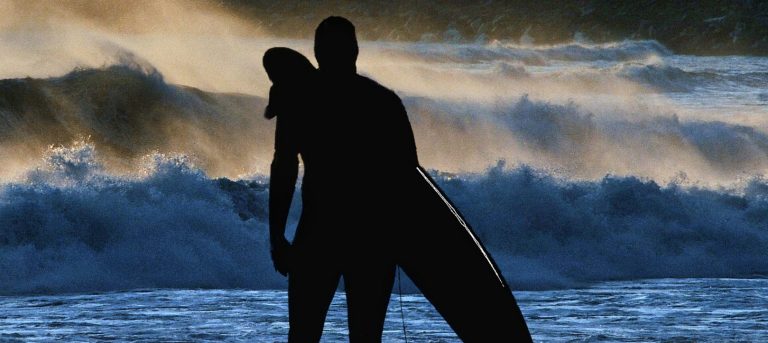By TIM SMITH
The thrills of surfing are probably no greater than when a major storm approaches Bermuda – but adrenalin junkies should consider the dangers of taking needless risks.
And it’s not just your own life that you are placing under threat, according to national disaster coordinator Steve Cosham of the Emergency Measures Organisation.
Countless rescues have taken place in the island’s waters over the decades, but Mr Cosham points to examples overseas this year to show how easily tragedy can strike.
Police officer Kelly Foster died while trying to save a woman dragged into a whirlpool when she was canyoning in New South Wales, Australia, this January.
Three months later, Folajimi Olubunmi-Adewole, 20, died while trying to rescue a woman who fell from London Bridge into the Thames.
“If you do get into trouble, someone has to put their life at risk and come rescue you,” Mr Cosham said.
One of the most memorable incidents in Bermuda came in 2006, when 40 swimmers at Horseshoe Bay had to be rescued by lifeguards as they swam in high waves caused by Hurricane Helene.
The swimmers had got caught in large riptides and were unable to make their way back to shore, meaning lifeguards Alistair Jack, Jay Rewalt and Richard Collis had to reach them in dangerous high surf conditions and moving flash rip currents.
“It was chaos for 20 minutes and when we got the people back on the shore those on the beach gave us a spontaneous round of applause and were cheering loudly, it was quite surreal,” Mr Jack said at the time.
“I felt exhausted, as if I’d been in a fight and I was sore from the waves that were continually hitting me. I had bruises all over my body”.
The lifeguards were later presented with Certificate of Merit Awards by Prince Michael of Kent at the Commonwealth Council Meeting at South Africa House in Trafalgar Square, London.
A more recent rescue came in 2018, when lifeguard Beau Franklin and his wife Ali Watlington swam out to save a surfer caught up in a rip tide and high seas at Hungry Bay, Devonshire.
The surfer, Alex Marshall, had lost his surfboard and found himself unable to get himself out from the rocks in a dangerous part of the bay.
Mr Cosham acknowledged some people enjoy swimming or surfing in large waves.
“When do you stop enjoying the winds?” he asked. “It’s a judgement call. When Government buildings start to close, that’s when you should not be in the water.”
Mr Cosham also reflected on the importance of getting to your home in good time before a storm hits.
Residents should weigh up factors such as the tide, rainfall, your vehicle and your home’s location.
Leave yourself enough time to board up windows and move all your outdoor furniture to somewhere safe.
“Prior to a hurricane hitting us, we close down Government offices, schools, public transportation and the Causeway,” Mr Cosham said.
A Coralisle Group spokeswoman said: “People should also comply with the EMO guidelines to ensure they arrive at their place of refuge well in advance of the approaching storm. Waiting until the last minute could result in serious injury to themselves and others.”
During recent years, photographs and videos of fierce winds have circulated increasingly on social media as storms batter Bermuda.
The advice is clear: avoid the temptation to go outside to take your pictures.
A spokeswoman for BF&M said: “During a storm, remain indoors, ideally within the structurally strongest part of your house and away from doors or windows.
“Do not go outside until the EMO has stated it is safe to do so. We suggest that individuals stay inside and away from windows, skylights and doors.”
The EMO will release this information on the Government’s emergency broadcast station on 100.1FM.
Even after the storm appears to have calmed down, sightseeing brings further risks.
Mr Cosham said: “When the hurricane passes, everybody wants to go outside and look at their own property. We just have to make sure it’s not the eye and the hurricane has passed.
“Even if you think the winds are gone, we need to test them. You could be hit by high winds, with debris blowing about.
“Further afield, people are going to be checking on neighbours, making sure their neighbourhood is safe. I can understand that.
“People get their chainsaw out and clear their driveways. If you see powerlines down, don’t take any action. Call Belco.”
It is also important to avoid going out in your vehicle shortly after the storm has finished.
“I understand the natural inclination to go outside, but we say to people don’t go outside,” Mr Cosham said.
“When people are on the road sightseeing, they slow up the Regiment, Parks and emergency services that are out doing their job. The message is please don’t do that. Don’t go out in your cars.”
Residents, of course, will be keen to assess any damage on their own property.
The BF&M spokeswoman said: “Once it is safe to do so, protect your property from further damage if possible.
“If you are thinking of making a claim for damage incurred, record evidence of the damaged areas prior to and during clean up.
“Photos speak volumes, and it’s a good idea to take pictures of your property before a storm for comparison.”
As always when it comes to hurricanes, all advice points to being properly prepared.
The Coralisle Group spokeswoman said: “The public is advised to stock up on supplies in advance of the storm’s approach. They should also consult with their insurers regarding their policies to ensure they are current and adequately covered.”

